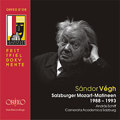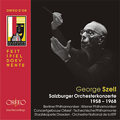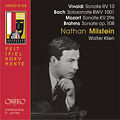ORFEO International – Reviews
Important Releases Briefly Introduced
August 2007
Salzburger Festspieldokumente 2007
ORFEO CD C 701 072 I
By way of an appendix to the Mozart celebrations of 2006, Orfeo is releasing Richard Strauss’s version of Idomeneo on its Salzburg Festspieldokumente label. 
C 701 072 IThis version of Mozart’s opera received two performances at the 2006 Salzburg Festival, uniquely complementing the „Mozart 22“ project. Strauss prepared his arrangement of Idomeneo in 1930-31. An example of his active love of Mozart, it was intended to bring to the attention of a wider audience a work he valued very highly. This live recording of one of the two concert performances given in Salzburg’s Felsenreitschule was ably and spiritedly conducted by Fabio Luisi with the Dresden State Opera Chorus and Orchestra. As such, it not only complements Mozart’s other operas in a much-admired performance, it also fills a gap in the gramophone catalogue.
* * *
ORFEO CD C 741 073 D
Two conductors who were significant figures in the history of the Salzburg Festival – Sándor Végh and George Szell – are central to two other special releases.
A 
C 741 073 Ddigibox containing previously unreleased recordings of Mozart Matinees from between 1988 and 1993 is released to mark the tenth anniversary of Sándor Végh’s death. The orchestra is the Camerata Academica of Salzburg and the pianist is András Schiff, the conductor’s favourite soloist. Sándor Végh was in many respects an important figure in the musical life of Salzburg: as a soloist, as a chamber musician, as an orchestral conductor and as a teacher. His work for the Salzburg Festival is already documented by numerous releases on the Orfeo label. His preferred venue was the Great Hall of the Mozarteum, where he first appeared with the Végh Quartet at the 1948 Salzburg Festival. It was a brilliant start to a long association with the Festival. The Camerata Academica was formed by Bernhard Paumgartner in 1952 and was made up of teachers and students from the Mozarteum. It was left to Sándor Végh to invest the Camerata with a wholly new significance. By 1983 his concerts with the Camerata Academica had become a fixture in the Salzburg Festival’s annual programmes. Many visitors to the Festival sought and found in Végh’s serenades, chamber recitals and orchestral concerts a concentration on the essential element of music that is all too often lost in the hurly-burly of the international glut of festivals.
* * *
ORFEO CD C 704 077 L
A second digibox, this time containing seven CDs at a special price, features the orchestral concerts that 
C 704 077 LGeorge Szell conducted at the Salzburg Festival between 1958 and 1968. Originally released in 1994/5 but long since unavailable, these recordings are now supplemented by a previously unpublished recording of Szell conducting a concert with the Berlin Philharmonic in 1964. George Szell was one of the first American conductors of any international standing to return to Europe after the Second World War. He conducted a series of performances of Der Rosenkavalier and a concert with the Vienna Philharmonic at the 1949 Festival. From 1952 onwards he was one of the Festival’s regular conductors, and between then and the summer of 1969 he conducted operas and concerts not only with the Vienna Philharmonic but also with the visiting orchestras that from 1957 onwards came to Salzburg each year.
* * *
ORFEO CD C 743 071 B und ORFEO CD C 742 071 B
Our 
C 743 071 Bseries of solo recitals is supplemented by two more: one by the violinist Nathan Milstein, the other by the pianist Géza Anda, who was particularly closely associated with Salzburg. One of the great violinists of the 20th century, Milstein is showcased by a recital which, entirely typical of this virtuoso, demonstrates in addition that the Viennese pianist Walter Klien was far more than a mere accompanist. Milstein’s Vivaldi is stylistically assured, his Bach supremely authoritative, his Mozart lean-toned and concentrated, and his Brahms both great and free. Géza Anda appeared at virtually every Festival over a period of more than two decades. For his final recital he chose a varied and colourful programme, which once again reflects the noble art of one of the great pianists of his age, a performer whom Wilhelm Furtwängler described as a „troubadour“ among musicians.
* * *
ORFEO CD C 744 071 B
The song recital given by 
C 744 071 BCesare Siepi brings back memories of the legendary production of Don Giovanni staged during the Mozart bicentenary celebrations of 1956. Both as Don Giovanni himself and in his recital programme that same summer, Siepi delighted audiences with his warm bass voice. It was in fact not so much a song recital in the strict sense of the term but more of a highly personal encounter with a great singer who was a declared favourite of the Salzburg Festival’s audiences. As such, it is also a prime example of the sort of great evening of singing with which the Festival was to regale its ecstatic audiences from 1956 onwards. Siepi’s programme was chosen to allow the singer to show off not only his beautiful voice and cultivated singing but also his artistic versatility.
top |